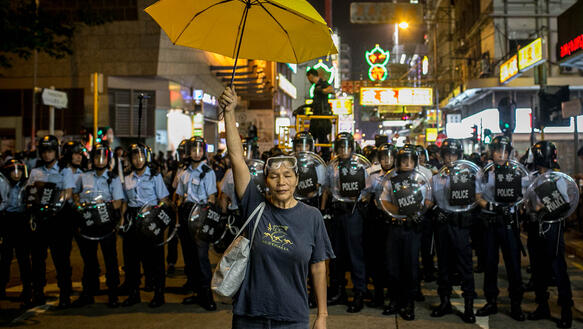DEINE SPENDE KANN LEBEN RETTEN!
Mit Amnesty kannst du dort helfen, wo es am dringendsten nötig ist.
DEINE SPENDE WIRKT!
EU: Lieferkettengesetz muss Menschenrechte stärker in den Blick nehmen

Für ein wirksames EU-Lieferkettengesetz: Petitionsübergabe an Bundeskanzler Olaf Scholz am 6. Dezember 2022 in Berlin.
© Initiative Lieferkettengesetz
Das EU-Parlament wird voraussichtlich am 1. Juni über das sogenannte EU-Lieferkettengesetz abstimmen. Das Gesetz soll regeln, welche Menschenrechts- und Umweltverpflichtungen Unternehmen in der EU haben. Doch es droht, durch Ausnahmen und Schlupflöcher untergraben zu werden. Dies dokumentiert Amnesty International in einem neuen Bericht.
Der Amnesty-Bericht "Closing the loopholes: Recommendations for an EU corporate sustainability law which works for rights holders" zeigt mehrere schwerwiegende Lücken in der vorgeschlagenen Gesetzgebung auf, über die das Europäische Parlament am 1. Juni abstimmen soll.
Kristina Hatas, Expertin für Wirtschaft und Menschenrechte bei Amnesty International in Deutschland, sagt: "Unser Bericht zeigt auf, warum eine Regelung voller Lücken und Schlupflöcher fatal ist und den Menschenrechtsschutz untergräbt. Wie das EU-Lieferkettengesetz final aussieht, kann aber Auswirkungen auf die Lebensrealität von Menschen weltweit haben."
Amnesty hat in der Vergangenheit dokumentiert, wie Kobalt aus der Demokratischen Republik Kongo, das unter Kinderarbeit und menschenunwürdigen Bedingungen abgebaut wurde, auch in Lieferketten deutscher Unternehmen gelang. Auf EU-Ebene steht unter anderem zur Debatte, ob Sorgfaltspflichten der Unternehmen nur für "etablierte Geschäftsbeziehungen" gelten sollen. In Fällen wie diesen könnten sich Unternehmen einfach aus der Verantwortung ziehen – denn sie hatten die Händler*innen vor Ort nicht direkt beauftragt.
An die Ampel-Koalition gerichtet sagt Hatas: "Die Bundesregierung hat sich im Koalitionsvertrag für ein wirksames EU-Lieferkettengesetz ausgesprochen, das auf den UN-Leitprinzipien für Wirtschaft und Menschenrechte gründet. Das deutsche Lieferkettengesetz, das seit diesem Jahr in Kraft ist, bleibt bisher hinter genau diesen internationalen Standards zurück. Darum ist das EU-Gesetz auch eine Chance, die Lücken im deutschen Lieferkettengesetz zu schließen und einen höheren Standard für die Menschenrechte zu setzen. Die deutschen Abgeordneten im Europaparlament und die Bundesregierung sind jetzt umso mehr gefragt, sich für ein wirksames EU-Lieferkettengesetz einzusetzen."
Der Amnesty-Bericht kann auf amnesty.org als PDF-Datei heruntergeladen werden.
+++ Nachfolgend ein englischsprachiges Statement von Hannah Storey, Expertin für Wirtschaft und Menschenrechte von Amnesty International. +++
AMNESTY INTERNATIONAL PRESS RELEASE
New business sustainability law must be strengthened to protect human rights
New legislation governing the human rights and environmental obligations of businesses in the EU, known as the Corporate Sustainability Due Diligence Directive, risks being undermined by exemptions and loopholes, Amnesty International said today.
A new report issued today, Closing the loopholes: Recommendations for an EU corporate sustainability law which works for rights holders, identifies several serious gaps in the proposed legislation, which is due to be voted on by the European Parliament on 1 June, before final negotiations between the EU’s governing bodies begin later next month.
Hannah Storey, Amnesty International’s Policy Advisor on Business and Human Rights, and the author of the report said:
"This new law could set a legal benchmark and protect people in Europe and beyond from corporate harms, closing a legislative gap which has allowed companies to perpetrate widespread rights abuses around the world and escape accountability.
"Yet the scope of the law as it is currently framed by the European Commission and EU member states is too narrow. It will fail to halt abuses related to the end use of many products, such as rubber bullets and other law enforcement equipment, which could still be exported to police or security services outside the EU and used to commit abuses.
"The legislation fails to sufficiently address the impact of businesses on climate change. It compels large companies to adopt climate mitigation plans but contains no obligation to implement them. Neither does it hold them liable for harm they may cause to the climate, despite climate change being fundamentally a human rights issue.
"Amnesty International urges EU lawmakers to strengthen what was proposed by the Commission and member states, and to develop strong legislation to halt corporate harm and support victims in accessing justice."
Barriers to justice heightened by gender and race
Victims of human rights harm have a right to effective remedy. The Corporate Sustainability Due Diligence Directive (CSDDD) will create an urgently needed route to remedy for victims of corporate-related harm, but it does not address the barriers victims face when trying to access justice.
Hannah Storey said: "When Indigenous Peoples, workers in garment supply chains, poor farmers, and human rights defenders confront massive corporate power and influence, the scales of justice are not balanced.
"This directive could vastly improve access to justice but the legislation fails to address existing barriers such as high costs and a lack of access to information, which means victims are more likely to remain without remedy."
Missing links in the value chain
The CSDDD requires companies to conduct human rights and environmental due diligence in relation to their own operations, and to their value chain.
Under international standards, the value chain normally refers to the full range of activities required to create a product, including the extraction of raw materials, and the use of a product or service.
The 'use of products’, however, has been removed from the CSDDD’s definition of the value chain.
"Limiting the definition of the value chain that companies are required to assess as part of their human rights and environmental due diligence, including a failure to account for the final use of their products, is likely to result in significant human rights abuses," said Hannah Storey.
For example, in My Eye Exploded, Amnesty International exposed how rubber bullets manufactured in France were used by Lebanese security forces to target and injure peaceful protestors in 2019 and 2020.
"The legislation should ensure companies assess their entire value chain for human rights and environmental risks so that appropriate action can be taken to address them," said Hannah Storey.
Exemptions for financial institutions and export controls
Financial institutions in the EU are currently exempted from elements of the CSDDD, even though they are known to have funded clients who caused or contributed to grievous human rights abuses.
"The legislation should apply to all companies across all sectors, including financial institutions, which should be required to conduct human rights and environmental due diligence just like any other business covered by the legislation," said Hannah Storey.
Further exemptions apply to sectors subject to export controls, such as weapons and surveillance technologies.
Hannah Storey said: "Amnesty International believes export controls are not an adequate substitute for human rights-based legislation. Companies producing items governed by export controls should still be required to conduct human rights and environmental due diligence under the CSDDD.
"People around the world have suffered horrendous harm as a result of the misuse of weapons and surveillance technologies, despite the existence of export controls on these products."










